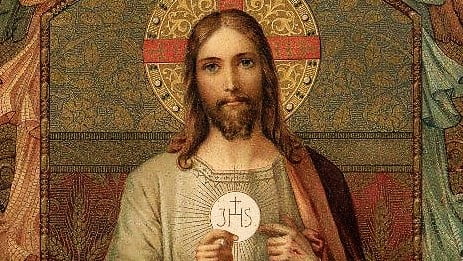SOLEMNITY OF CORPUS CHRISTI.
HISTORY AND THE FRUITS OF HOLY COMMUNION.
AV Summary + full text. Best with sound.

With the solemnity of Corpus Christi (latin words for the Body of Christ) he Church remembers with supreme gratitude for the gift of the Eucharist and adoringly prostrates herself before the real presence of the Eucharist, professing her faith.
HISTORY OF THE SOLEMNITY
God used Saint Juliana de Mont Cornillon to initiate this feast. Since her youth, Juliana, had a great veneration to the Blessed Sacrament. And she always missed a special feast in His honor. This desire is said to have been intensified by a vision that she had of the Church under the appearance of a full moon with a black stain, which meant the absence of this solemnity. She made this known to Jacques Pantaleon, the then Archdeacon of Liége, who later became Pope Urban IV, who proclaimed in 1264 the solemnity of “Corpus Christi” to be celebrated on the Thursday after the Most Holy Trinity Sunday, inspired as well of the Eucharistic Miracle which occurred at Bolsena in 1263, when a consecrated host began to bleed onto a corporal, as God’s way of removing the doubts of the priest who was celebrating the Holy Mass.
THE EUCHARISTIC MIRACLE IN BOLSENA-ORVIETO (ITALY)
It is one of the most important Eucharistic miracles in the history of the Church. It happened in the Cathedral of Orvieto (Italy), and after what happened, it was Pope Urban IV who instituted the Solemnity of Corpus Christi
In the middle of the 13th century, Fr. Peter of Prague doubted the presence of Christ in the Eucharist and made a pilgrimage to Rome to pray on the tomb of Saint Peter for a grace that would restore his faith.
After returning from the pilgrimage, he went to Bolsena to celebrate Holy Mass in the crypt of Santa Cristina. It was at that moment when the Sacred Host bled and stained the corporal with the most precious blood.
The news quickly reached Pope Urban IV, who was nearby in Orvieto, and he asked for the corporal to be brought to him. The revered relic was carried in procession and it is said that the Pontiff, seeing the miracle, knelt in front of the body and then showed it to the population.
Later, the Holy Father published the bull “Transiturus“, with which he ordered that the Solemnity of Corpus Christi be celebrated throughout the Church on the Thursday after Holy Trinity Sunday.
Likewise, Pope Urban IV entrusted Saint Thomas Aquinas with the preparation of a liturgical office for the feast and the composition of hymns, which are sung to this day as the Tantum Ergo.
The holy relic is currently kept in Orvieto Cathedral and can be seen in a chapel built in honor of this Eucharistic miracle.
In addition, the corporal stained with the Blood of Christ is brought out in procession every year during the Solemnity of Corpus Christi and presides over the Eucharistic celebrations in the Cathedral.
THE FRUITS OF HOLY COMMUNION
- The manna during the Exodus was a figure of this Bread — Jesus Christ himself — which nourishes Christians on their pilgrimage through this world.
- Communion is the wonderful banquet at which Christ gives himself to us: “the bread which I shall give for the life of the world is my flesh”. These words promise the manifestation of the Eucharist at the Last Supper: ‘‘This is my body which is for you’’ (1 Cor 11:24). The words ‘‘for the life of the world’’ and “for you’’ refer to the redemptive value of the sacrifice of Christ on the Cross. Jesus stresses very forcefully that it is necessary to receive him in the Blessed Eucharist in order to share in divine life and develop the life of grace received in Baptism.
- No parent is content to bring children into the world: they have to be nourished and looked after to enable them reach maturity.
- “We receive Jesus Christ in Holy Communion to nourish our souls and to give us an increase of grace and the gift of eternal life” (St Pius X, Catechism of Christian Doctrine, 289). In the same way as bodily food is necessary for life on earth, Holy Communion is necessary for maintaining the life of the soul, which is why the Church exhorts us to receive this Sacrament frequently in the state of grace for the fruits of receiving Our Lord in the Holy Eucharist are numerous: “Holy Communion INCREASES OUR UNION WITH CHRIST AND WITH HIS CHURCH. It PRESERVES AND RENEWS THE LIFE OF GRACE received at Baptism and Confirmation and makes us GROW IN LOVE FOR OUR NEIGHBOR. IT STRENGTHENS US IN CHARITY, WIPES AWAY VENIAL SINS and PRESERVES US FROM MORTAL SIN IN THE FUTURE (Compendium, n. 292).”
Dear brethren in Christ, let us thank God for his immense love for us, inventing a way to be with us and in us, through the Sacrament of the Holy Eucharist. Let us make the resolution to receive our Lord in a worth manner, that is, in the state of grace (without mortal sins), adore, love, and glorify Him in all our actions throughout the day. Happy Solemnity of Corpus Christi (or the Body and Blood of Our Lord Jesus Christ)! Fr. Rolly Arjonillo.
AUDIO CREDIT: Philippine Madrigal Singers, “Anima Christi (Bukas Palad)” in their album “Acclamation” by Sony BMG Entertainment. With permission from Sir Mark Anthony Carpio, choirmaster of UPM. Thanks, Mark!
Stay updated: subscribe by email for free TO OUR NEW WEBSITE www.catholicsstrivingforholiness.org (PUT YOUR EMAIL IN THE SUBSCRIBE WIDGET).
We are also in www.fb.com/Catholicsstrivingforholiness. Kindly help more people in their Christian life by liking our page and inviting your family, friends and relatives to do so as well. Thanks in advance and God bless you and your loved ones! Fr. Rolly Arjonillo